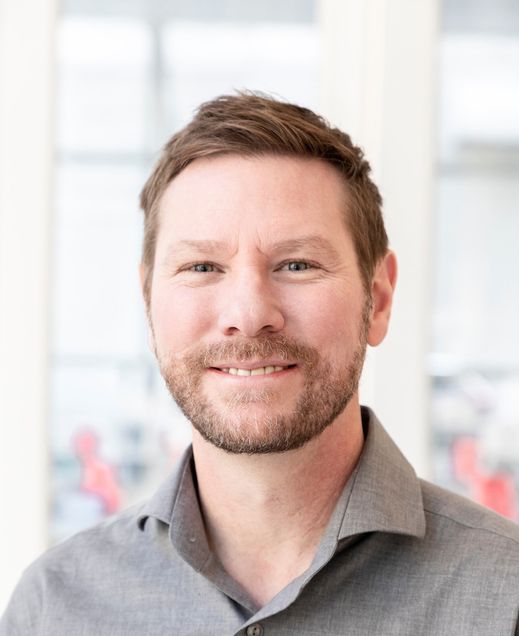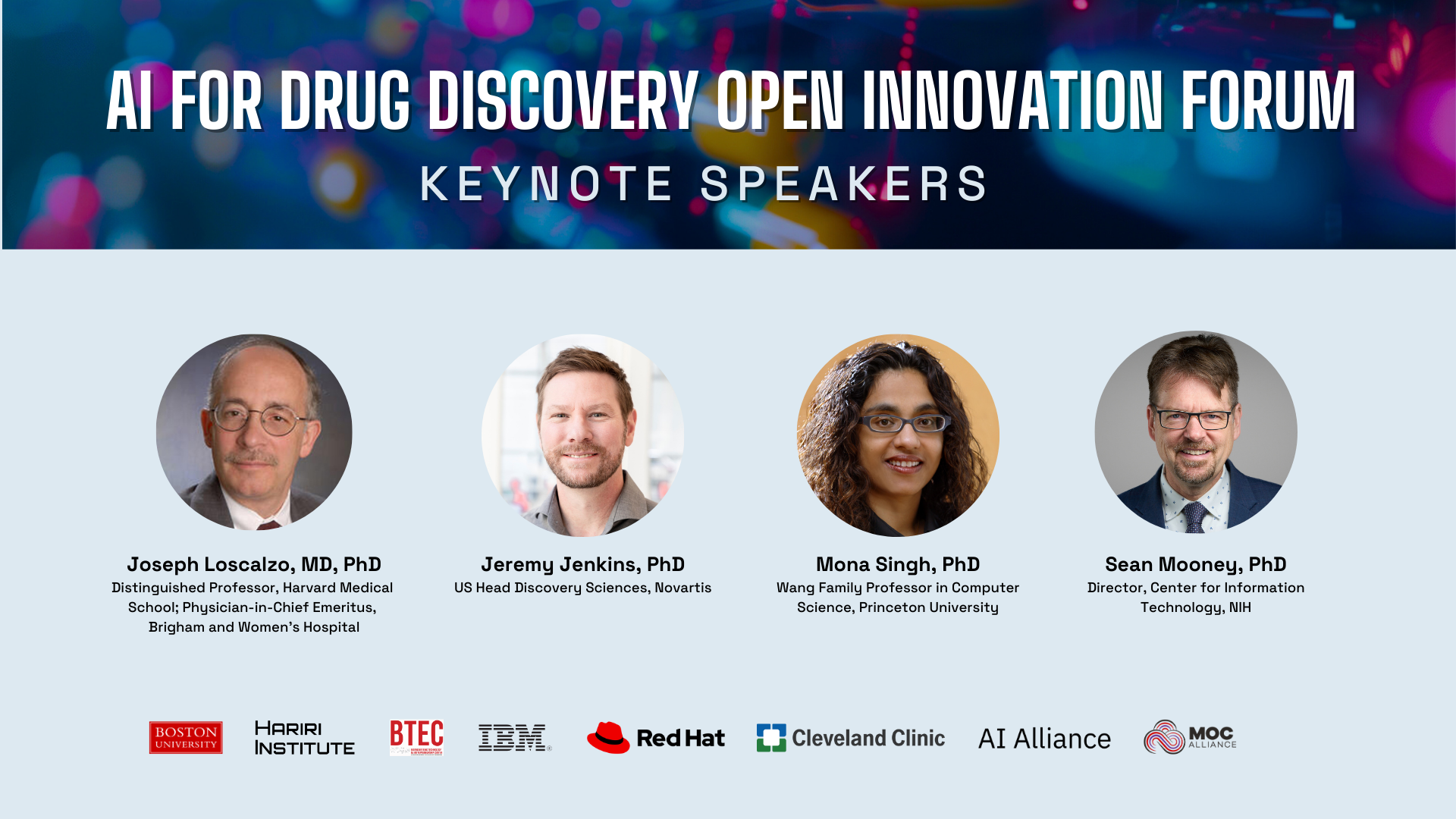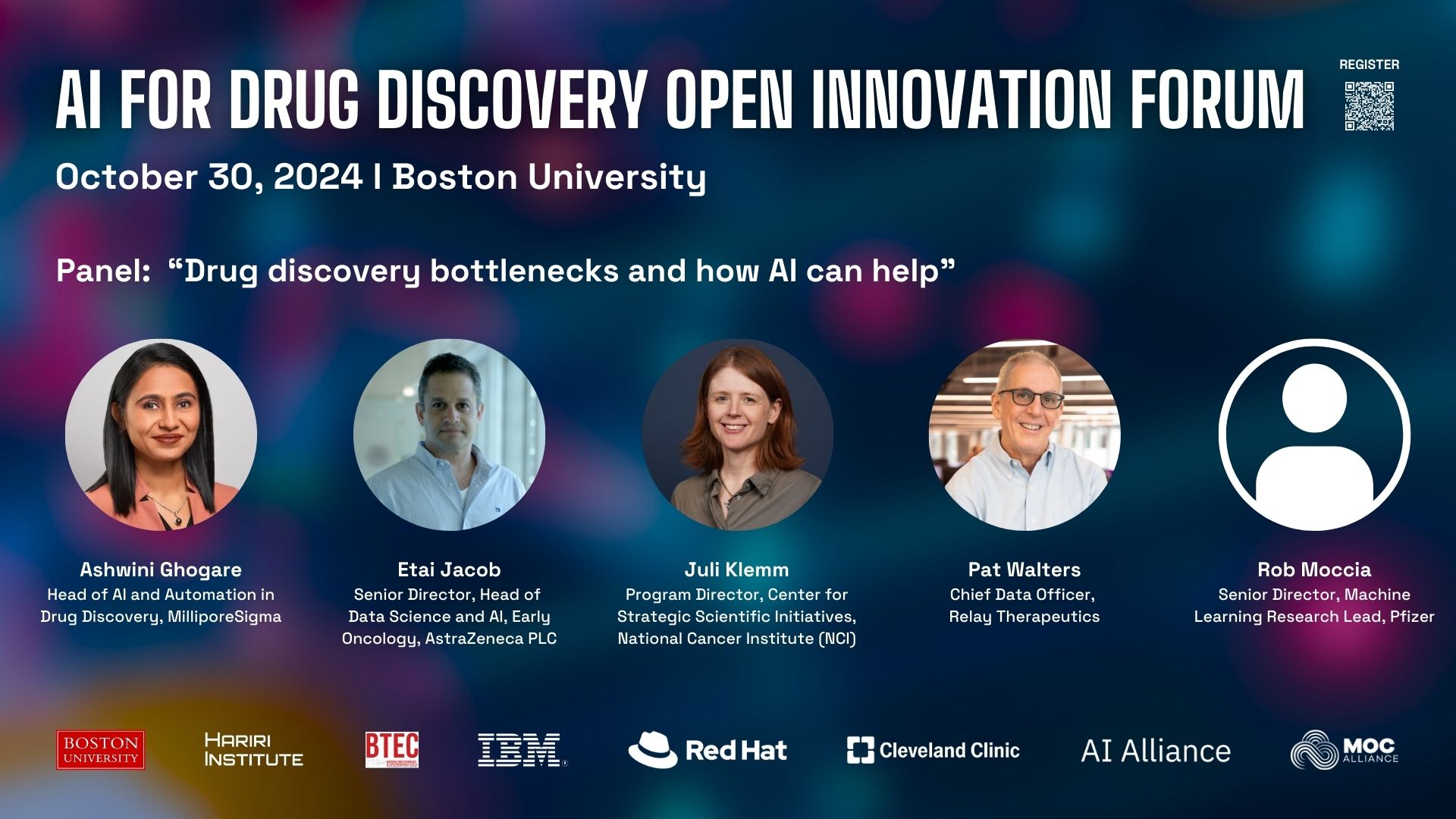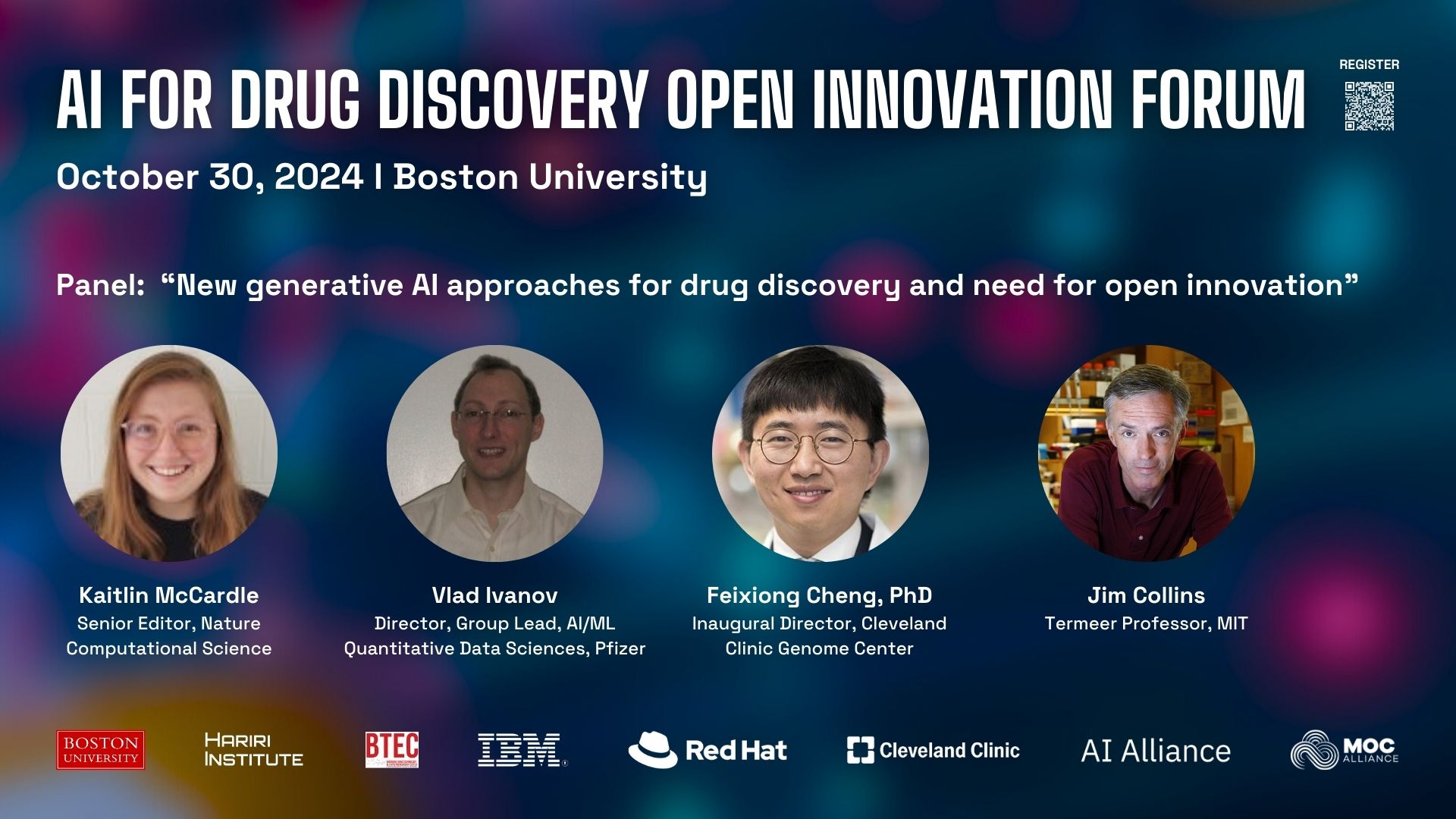Wednesday, October 30, 2024
8:30am – 6:30pm ET
Location (in-person): Boston University, Center for Computing & Data Sciences, 665 Commonwealth Ave, Room 1750, Boston, MA
Safe and responsible AI needs to be developed in the open. The objective of the AI for Drug Discovery Open Innovation Forum is to establish a world-class open research community to drive the development, evaluation, and large-scale adoption of AI foundation models for accelerated scientific advancements for drug discovery. The one-day event will consist of an opening session with keynotes and panels highlighting the state of the art in AI technologies and pressing bottlenecks and challenges in drug discovery, followed by breakout sessions to identify and prioritize key AI technologies and activities that should be developed in the open. The event will also include, a hands-on sessions with opportunities to work with open-source foundation models for drug discovery such as Biomedical Foundation Models. The forum will serve as the kickoff event of a new AI for Drug Discovery working group within the AI Alliance. A key objective of the forum is to identify open development priorities for this working group. This event is open to everyone—we encourage anyone interested to join us and participate.
This event is organized & cosponsored by Boston University’s Hariri Institute, BU Bioengineering Technology & Entrepreneurship Center, MOC Alliance, Red Hat, IBM, the Cleveland Clinic and the AI Alliance. Founded in 2023, The AI Alliance is an international community of technology developers, researchers and industry leaders who collaborate to advance safe, responsible AI rooted in open innovation.
Detailed Program
| Begins | Ends | Talks | Speaker | |
|---|---|---|---|---|
| 8:00AM | 8:30AM |
Breakfast |
||
| 8:30AM | 8:35AM | Welcome | Gloria Waters, Provost and Chief Academic Officer at Boston University | |
| 8:35AM | 8:50AM | State Remarks | Yvonne Hao, Secretary of Economic Development and Kirk Taylor, M.D., President and CEO of the Massachusetts Life Sciences Center | |
| 8:50AM | 9:00AM | Introduction | Yannis Paschalidis, PhD, Director, Hariri Institute for Computing, and Jianying Hu, PhD, IBM Fellow, Director, HCLS Research and Global Science Leader, AI for Health | |
| 9:00AM | 9:25AM | Keynote
Talk Title: “Challenges in Contemporary Drug Discovery” Abstract: Drug discovery is a complicated semi-empirical process that fails ~90% of the time. The reasons for this high failure rate are multiple and include the presence of competing targets within a cell or organism; the existence of multiple conformations of any single target protein; significant inconsistencies in binding or kinetic constants in cell-free vs. cellular systems; and failure to consider the effect of a drug on its target(s) within the complex cellular protein-protein interaction network and its consequences for phenotype. In this presentation, I will discuss the evolving landscape of computational approaches used to identify disease determinants and drug targets, including network- and AI-based approaches and quantum-inspired strategies; experimental approaches to characterizing the dynamic interactions of drugs and their targets in real time in single cells; and efficient single-cell strategies for assessing combinations of drugs. These principles will be illustrated with examples from specific diseases. The strategies presented will ultimately contribute to and guide the ongoing evolution of precision medicine. |
Bio: Joseph Loscalzo is the Samuel A. Levine Professor of Medicine and the Hersey Distinguished Professor of the Theory and Practice of Medicine at Harvard Medical School, and Physician-in-Chief Emeritus at Brigham and Women’s Hospital. He is a summa cum laude graduate of the University of Pennsylvania, where he also obtained his M.D. and Ph.D. in biochemistry. He has published over 1,200 scientific articles, written or edited 54 books, and holds 33 patents. His research focus has been in the areas of vascular and redox biology, systems biology, and network medicine, with continuous funding from the NIH for over 35 years. He is a member of the American Society of Clinical Investigation, the Association of American Physicians, the National Academy of Medicine, and the American Academy of Arts and Sciences. |
|
| 9:25AM | 9:50AM |
Keynote Talk Title: “Generative AI Applications in Early Drug Discovery” Abstract: Research in the early phases of drug discovery is fueled by ever-increasing data and data types that are amenable to machine learning (ML). From disease understanding and target identification to assay development and therapeutics design, AI models are making inroads to increasing the efficiency and creativity of research. Generative AI goes beyond classical ML in the ability to synthesize information from large-scale patterns in data. Case studies in genomics, genetics, text, chemistry, protein structure, and imaging are provided to illustrate the transformative impact of generative AI on the future of making medicines.
|

Jeremy Jenkins, PhD, US Head Discovery Sciences, Novartis Bio: Jeremy Jenkins is the US Head of Discovery Sciences in Novartis Biomedical Research. He joined Novartis as a postdoc in 2003, following a postdoc at Harvard Medical School and a PhD in Molecular Genetics from The Ohio State University. He received the 2011 Corwin Hansch Award for contributions to the field of QSAR, and the 2017 Novartis Leading Scientist VIVA award for helping to develop the field of in silico chemical biology. His global research teams at Novartis focus on early drug discovery projects and enabling technologies for target ID and lead discovery. |
|
| 9:50AM | 10:05AM | Coffee Break | ||
| 10:05AM | 10:30AM | Keynote
Talk Title: “Protein language models: their power, limitations and future directions” Abstract: Protein language models are one of the most exciting recent advances in modeling protein sequences. Among other applications, they have proven to be powerful in predicting structures, interactions and functions, and in assessing the impact of amino acid mutations, all central tasks in identifying disease targets. I will discuss how my group has is using protein language models in a variety of settings, and how we are “stress testing” their capabilities in a range of applications. I will conclude by discussing promising avenues for future work. |
Bio: Mona Singh is the Wang Family Professor in Computer Science at Princeton University, where she is jointly appointed in the Computer Science department and the Lewis-Sigler Institute for Integrative Genomics. Mona received the Presidential Early Career Award for Scientists and Engineers (PECASE). She is a Fellow of the International Society for Computational Biology and a Fellow of the Association for Computing Machinery. She was Chair of the NIH Modeling and Analysis of Biological Systems Study Section (2012-2014), and was a council member of the CRA’s Computing Community Consortium (2021-2024). She is currently Editor-In-Chief of the Journal of Computational Biology. |
|
| 10:30AM | 10:55AM |
Keynote Talk Title: “AI@NIH: Drug Discovery, Clinical Healthcare, and Multimodal AI” Abstract: The National Institutes of Health (NIH), a part of the U.S. Department of Health and Human Services, is the nation’s medical research agency — making important discoveries that improve health and save lives. Data Science and artificial intelligence (AI) is an NIH-wide priority initiative to take better advantage of the exponential growth of biomedical research datasets, which is an area of critical importance to biomedical research. NIH engages with partners both within NIH and in academia, industry, non-profits, or other government Agencies, to coordinate access to and analysis of many different data types (Big Data) that make up this revolution in biological information. The Office of Data Science Strategy, the Center for Information Technology, the National Library of Medicine, and the other NIH Institutes and Centers regularly collaborate to enable research that leverages AI. In this presentation, existing NIH strategy in research data platforms and AI will be presented along with an overview of ongoing projects in AI and Data Science.
|
Bio: Dr. Sean Mooney, Ph.D., serves as the Director of CIT and the NIH Associate Director for Information Technology, Cyberinfrastructure and Cybersecurity (AD ITCC). As the Director of CIT, he is responsible for providing leadership, vision, and direction for the organization. This includes overseeing an approximately $400 million portfolio that includes a world-renowned supercomputer that allows researchers to conduct large-scale data analyses; a state-of-the-art network that enables research across NIH and around the world; cloud-based services that give researchers a cost-effective way to access datasets and advanced computational tools and services; and the latest collaboration tools to promote flexibility and productivity. As the Associate Director for ITCC, Dr. Mooney oversees the NIH Office of the Chief Information Officer, which is responsible for NIH enterprise IT strategy, policy, architecture and oversight of a $1.9 billion IT budget. |
|
| 10:55AM | 12:00PM | Panel discussion
“Drug discovery bottlenecks and how AI can help” |
Moderator: Diane Joseph-McCarthy, PhD, Executive Director, Bioengineering Technology & Entrepreneurship Center; Professor of the Practice (BME, Chemistry)
Panelists: Etai Jacob, Senior Director, Head of Data Science and AI, Early Oncology, AstraZeneca PLC Ashwini Ghogare, Head of AI and Automation in Drug Discovery, MilliporeSigma Juli Klemm, Program Director, Center for Strategic Scientific Initiatives, National Cancer Institute (NCI) Rob Moccia, Senior Director, Machine Learning Research Lead, Pfizer Pat Walters, Chief Data Officer, Relay Therapeutics |
|
| 12:00PM | 12:45PM |
Networking Lunch |
||
| 12:45PM | 1:45PM |
Panel discussion “New generative AI approaches for drug discovery and need for open innovation”
|
Moderator: Michal Rosen-Zvi, Director, AI for Drug Discovery, IBM Research
Panelists: Kaitlin McCardle, Senior Editor, Nature Computational Science Vlad Ivanov, Director, Group Lead, AI/ML Quantitative Data Sciences, Pfizer Feixiong Cheng, PhD, Inaugural Director, Cleveland Clinic Genome Center Jim Collins, Termeer Professor of Medical Engineering & Science, Professor, Department of Biological Engineering, Massachusetts Institute of Technology; Wyss Institute, Harvard University; Broad Institute of MIT and Harvard |
|
| 1:45PM | 2:00PM | Coffee Break | ||
| 2:00PM | 3:00PM |
Breakout sessions “Prioritization of Open Innovation Tasks” |
Breakout: Benchmarks Room Location: TBD
Breakout: Multi-Modal Fusion
Breakout: Model Architecture
Breakout: Challenges/Competitions
|
|
| 3:00PM | 3:45PM |
Workstream Readout & Next Steps |
||
| 3:45PM | 4:00PM |
Coffee break |
||
| 4:00PM | 5:00PM | Hands-on Session: Open-source software tools to support AI model building | This hands-on demo will offer people the chance to work with recently released open source models for drug discovery. Using the Mass Open Cloud (MOC), participants will see how to run inference, use notebooks to submit various types of protein combinations to the models, and learn more about how IBM Research creates and trains open source models. Please stop by the registration desk to get access to the MOC if you did not already do this before the day of the forum.
*To participate in the demo, please bring a laptop. Location: CDS 1101 |
|
| 5:00PM | 5:15PM | Closing Remarks | Yannis Paschalidis, PhD, Director, Hariri Institute for Computing, and Jianying Hu, PhD, IBM Fellow, Director, HCLS Research and Global Science Leader, AI for Health | |
| 5:15PM | 6:30PM |
Networking Reception |
||
Opening Remarks - 8:30AM - 9:00AM

Welcome: 8:30AM – 8:35AM
Speaker: Gloria Waters, PhD, Provost and Chief Academic Officer at Boston University
State Remarks: 8:35AM – 8:50AM
Speaker: Yvonne Hao, Secretary of the Executive Office of Economic Development, Commonwealth of Massachusetts
Speaker: Kirk Taylor, M.D., President and CEO of the Massachusetts Life Sciences Center
Introductions: 8:50AM – 9:00AM
Speaker: Yannis Paschalidis, PhD, Director, Hariri Institute for Computing; Distinguished Professor of Engineering, Boston University
Speaker: Jianying Hu, PhD, IBM Fellow, Director, HCLS Research and Global Science Leader, AI for Health, IBM Research
Keynote Speaker Sessions - 9:00AM-10:55AM


Keynote Session: 9:00 AM – 9:25 AM
Speaker: Joseph Loscalzo, MD, PhD, Samuel A. Levine Professor of Medicine, Hersey Distinguished Professor of the Theory and Practice of Medicine, Harvard Medical School, Physician-in-Chief Emeritus, Brigham and Women’s Hospital
Talk Title: “Challenges in Contemporary Drug Discovery”
Abstract: Drug discovery is a complicated semi-empirical process that fails ~90% of the time. The reasons for this high failure rate are multiple and include the presence of competing targets within a cell or organism; the existence of multiple conformations of any single target protein; significant inconsistencies in binding or kinetic constants in cell-free vs. cellular systems; and failure to consider the effect of a drug on its target(s) within the complex cellular protein-protein interaction network and its consequences for phenotype. In this presentation, I will discuss the evolving landscape of computational approaches used to identify disease determinants and drug targets, including network- and AI-based approaches and quantum-inspired strategies; experimental approaches to characterizing the dynamic interactions of drugs and their targets in real time in single cells; and efficient single-cell strategies for assessing combinations of drugs. These principles will be illustrated with examples from specific diseases. The strategies presented will ultimately contribute to and guide the ongoing evolution of precision medicine.
Bio: Joseph Loscalzo is the Samuel A. Levine Professor of Medicine and the Hersey Distinguished Professor of the Theory and Practice of Medicine at Harvard Medical School, and Physician-in-Chief Emeritus at Brigham and Women’s Hospital. He is a summa cum laude graduate of the University of Pennsylvania, where he also obtained his M.D. and Ph.D. in biochemistry. He has published over 1,200 scientific articles, written or edited 54 books, and holds 33 patents. His research focus has been in the areas of vascular and redox biology, systems biology, and network medicine, with continuous funding from the NIH for over 35 years. He is a member of the American Society of Clinical Investigation, the Association of American Physicians, the National Academy of Medicine, and the American Academy of Arts and Sciences.

Keynote Session: 9:25AM – 9:50AM
Speaker: Jeremy Jenkins, PhD, US Head Discovery Sciences, Novartis
Talk Title: “Generative AI Applications in Early Drug Discovery”
Abstract: Research in the early phases of drug discovery is fueled by ever-increasing data and data types that are amenable to machine learning (ML). From disease understanding and target identification to assay development and therapeutics design, AI models are making inroads to increasing the efficiency and creativity of research. Generative AI goes beyond classical ML in the ability to synthesize information from large-scale patterns in data. Case studies in genomics, genetics, text, chemistry, protein structure, and imaging are provided to illustrate the transformative impact of generative AI on the future of making medicines.
Bio: Jeremy Jenkins is the US Head of Discovery Sciences in Novartis Biomedical Research. He joined Novartis as a postdoc in 2003, following a postdoc at Harvard Medical School and a PhD in Molecular Genetics from The Ohio State University. He received the 2011 Corwin Hansch Award for contributions to the field of QSAR, and the 2017 Novartis Leading Scientist VIVA award for helping to develop the field of in silico chemical biology. His global research teams at Novartis focus on early drug discovery projects and enabling technologies for target ID and lead discovery.

Keynote Session: 10:05AM – 10:30AM
Speaker: Mona Singh, PhD, Wang Family Professor in Computer Science, Princeton University
Talk Title: “Protein language models: their power, limitations and future directions”
Abstract: Protein language models are one of the most exciting recent advances in modeling protein sequences. Among other applications, they have proven to be powerful in predicting structures, interactions and functions, and in assessing the impact of amino acid mutations, all central tasks in identifying disease targets. I will discuss how my group has is using protein language models in a variety of settings, and how we are “stress testing” their capabilities in a range of applications. I will conclude by discussing promising avenues for future work.
Bio: Mona Singh is the Wang Family Professor in Computer Science at Princeton University, where she is jointly appointed in the Computer Science department and the Lewis-Sigler Institute for Integrative Genomics. Mona received the Presidential Early Career Award for Scientists and Engineers (PECASE). She is a Fellow of the International Society for Computational Biology and a Fellow of the Association for Computing Machinery. She was Chair of the NIH Modeling and Analysis of Biological Systems Study Section (2012-2014), and was a council member of the CRA’s Computing Community Consortium (2021-2024). She is currently Editor-In-Chief of the Journal of Computational Biology.

Keynote Session: 10:30AM – 10:55AM
Speaker: Sean Mooney, PhD, Director, Center for Information Technology, NIH
Talk Title: “AI@NIH: Drug Discovery, Clinical Healthcare, and Multimodal AI”
Abstract: The National Institutes of Health (NIH), a part of the U.S. Department of Health and Human Services, is the nation’s medical research agency — making important discoveries that improve health and save lives. Data Science and artificial intelligence (AI) is an NIH-wide priority initiative to take better advantage of the exponential growth of biomedical research datasets, which is an area of critical importance to biomedical research. NIH engages with partners both within NIH and in academia, industry, non-profits, or other government Agencies, to coordinate access to and analysis of many different data types (Big Data) that make up this revolution in biological information. The Office of Data Science Strategy, the Center for Information Technology, the National Library of Medicine, and the other NIH Institutes and Centers regularly collaborate to enable research that leverages AI. In this presentation, existing NIH strategy in research data platforms and AI will be presented along with an overview of ongoing projects in AI and Data Science.
Bio: Dr. Sean Mooney, Ph.D., serves as the Director of CIT and the NIH Associate Director for Information Technology, Cyberinfrastructure and Cybersecurity (AD ITCC). As the Director of CIT, he is responsible for providing leadership, vision, and direction for the organization. This includes overseeing an approximately $400 million portfolio that includes a world-renowned supercomputer that allows researchers to conduct large-scale data analyses; a state-of-the-art network that enables research across NIH and around the world; cloud-based services that give researchers a cost-effective way to access datasets and advanced computational tools and services; and the latest collaboration tools to promote flexibility and productivity. As the Associate Director for ITCC, Dr. Mooney oversees the NIH Office of the Chief Information Officer, which is responsible for NIH enterprise IT strategy, policy, architecture and oversight of a $1.9 billion IT budget.
Panel: “Drug discovery bottlenecks and how AI can help” - 10:55AM -12:00PM

Moderator: Diane Joseph-McCarthy, PhD, Executive Director, Bioengineering Technology and Entrepreneurship Center; Professor of the Practice (BME, Chemistry)
Panelists:
Etai Jacob, PhD, Senior Director, Head of Data Science and AI, Early Oncology, AstraZeneca PLC
Ashwini Ghogare, PhD, Head of AI and Automation in Drug Discovery, MilliporeSigma
Juli Klemm, PhD, Program Director, Center for Strategic Scientific Initiatives, National Cancer Institute (NCI)
Pat Walters, PhD, Chief Data Officer, Relay Therapeutics
Rob Moccia, PhD, Senior Director, Machine Learning Research Lead, Pfizer
Panel: “New generative AI approaches for drug discovery and need for open innovation” - 12:45PM - 1:45PM

Moderator: Michal Rosen-Zvi, PhD, Director, AI for Drug Discovery, IBM Research
Panelists:
Kaitlin McCardle, PhD, Senior Editor, Nature Computational Science
Vlad Ivanov, PhD, Director, Group Lead, AI/ML Quantitative Data Sciences, Pfizer
Feixiong Cheng, PhD, Inaugural Director, Cleveland Clinic Genome Center
Jim Collins, PhD, Termeer Professor of Medical Engineering & Science, Professor, Department of Biological Engineering, Massachusetts Institute of Technology; Wyss Institute, Harvard University; Broad Institute of MIT and Harvard University
Breakout Sessions and Readout: “Prioritization of Open Innovation Tasks” - 2:00PM - 3:45PM
Breakout: Benchmarks
Room Location: CDS 548
Pat Walters, PhD, Chief Data Officer, Relay Therapeutic
Wendy Cornell, PhD, Manager and Strategy Lead for Drug Discovery Technologies Ecosystem and Partnerships, IBM
Breakout: Multi-Modal Fusion
Room Location: CDS 1101
Alex Shalek, PhD, Director, Institute for Medical Engineering & Science; Director, Health Innovation Hub; J.W. Kieckhefer Professor, IMES, Chemistry, MIT
James Kozloski, PhD, Principal Research Scientist; Sr. Manager, Biomedical AI – Healthcare & Life Science Research, IBM
Breakout: Model Architecture
Room Location: CDS 701
Ching-Huei Tsou, PhD, Senior Research Scientist and Manager, Biomedical Foundation Model / NLP | Accelerated Discovery | HCLS, IBM
Chengxi Zang, PhD, Instructor in Population Health Sciences, Weill Cornell Medical College
Breakout: Challenges/Competitions
Room Location: CDS 1238
Pablo Meyer, PhD, Senior Research Scientist, Manager, Biological Analytics and Modeling, Center for Computational Health, IBM
Demetri Moustakas, PhD Treeline Biosciences
Hands-on Session: Open-source software tools to support AI model building - 4PM - 5PM
*To participate in the demo, please bring a laptop.
Location: CDS 1101
Networking Reception – 5:15PM – 6:30PM
Logistical Information
Public Transportation
Due to limited parking & potential construction, we encourage public transportation. MBTA Green Line B branch, as well as a few minutes walking distance from stops on the C (St. Mary’s Street) & D (Fenway) branches.
Parking
On-street, two-hour meter parking is limited & available on Commonwealth Ave. There is free two-hour parking on the side streets.
Hotel Suggestions
Below are our recommended hotels for participants attending the event. We suggest making reservations as early as possible to secure your stay.
• Hotel Commonwealth (866-784-4000) is a 10-minute walk.
• Eliot Hotel (1-800-44-ELIOT) is a 15-minute walk.
• Hyatt Regency Cambridge (1-800-233-1234) is a 5-minute taxi across the river.
Boston University Wifi
The BU Guest network allows visitors to access the Internet through BU’s wireless network. Please note that personal wireless access points are prohibited on the BU network because they interfere with network traffic. To access BU Guest (unencrypted): Connect to the network called “BU Guest (unencrypted)“ from your list of available networks.
Questions
This event is organized & co-sponsored by Boston University’s Hariri Institute, BU Bioengineering Technology & Entrepreneurship Center, MOC Alliance, Red Hat, IBM, the Cleveland Clinic and the AI Alliance. Founded in 2023, the AI Alliance is an international community of technology developers, researchers and industry leaders who collaborate to advance safe, responsible AI rooted in open innovation. This event is open to everyone—we encourage anyone interested to join and participate.
Thank you to the organizers & the AI Alliance.
 Yannis Paschalidis, PhD, Director, Hariri Institute for Computing; Distinguished Professor of Engineering, Boston University
Yannis Paschalidis, PhD, Director, Hariri Institute for Computing; Distinguished Professor of Engineering, Boston University
 Jianying Hu, PhD, IBM Fellow, Director, HCLS Research and Global Science Leader, AI for Health, IBM Research
Jianying Hu, PhD, IBM Fellow, Director, HCLS Research and Global Science Leader, AI for Health, IBM Research
 Diane Joseph-McCarthy, PhD, Executive Director, Bioengineering Technology & Entrepreneurship Center; Professor of the Practice (BME, Chemistry)
Diane Joseph-McCarthy, PhD, Executive Director, Bioengineering Technology & Entrepreneurship Center; Professor of the Practice (BME, Chemistry)
 Michal Rosen-Zvi, PhD, Director, AI for Drug Discovery, IBM Research
Michal Rosen-Zvi, PhD, Director, AI for Drug Discovery, IBM Research
 Feixiong Cheng, PhD, Inaugural Director, Cleveland Clinic Genome Center
Feixiong Cheng, PhD, Inaugural Director, Cleveland Clinic Genome Center
Connect with us
Join us on social media where we share news and information about research being done by our faculty and student affiliates.
